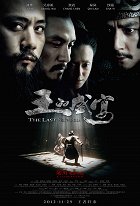Directed by:
Chuan LuCast:
Ye Liu, Daniel Wu Yin-cho, Chen Chang, Mi Yang, Yulai Lu, Yuan Nie, Liang Zhao, Dao Qi, Cuckoo He, Lan Qin, Liang Zhao, Wei LiuPlots(1)
An epic story of war, of dreams fulfilled and of betrayals - betrayals of friendship, of ideals, and of oneself. Yu is a young noble: handsome, brave, admired. Commander of the era's most powerful army, he leads the revolt against the cruel Qin dynasty. Yu recognizes great potential in Liu, a peasant, and gives him command of 5,000 soldiers. Liu breaks an agreement with Yu by entering and ransacking the Qin capital alone. The Qin dynasty falls and Yu rules. Wary of treachery, his advisers plot to kill Liu at a great banquet, but the emperor spares his life. From the time of this 'last supper', Liu will wage war against Yu. Xin, Yu's bodyguard, joins him. Defeated, Yu commits suicide on the battlefield rather than submit to capture. Yu is dead, but now Xin is a threat. Liu imprisons then releases him, but broods about having spared Xin's life as Yu spared his... Xin too must die. Finally, Emperor Liu has reached his goal. But his soul remains deeply troubled - haunted by the ghosts of his betrayals, unable to find peace in the position he dreamed of and fought ruthlessly to achieve... (Wild Bunch Distribution)
(more)Reviews (1)
Lu Chuan confirmed his status as a filmmaker who doesn’t have a specific distinctive style or his own central theme, but whose qualities consist in the ability to get to the core of popular genres and present them in a previously unseen and maximally impressive form. After the phenomenal and devastating psychological war drama Nanking! Nanking!, he latched onto the format of narrative historical dramas about intrigues in the court of powerful rulers. In his rendering, this involves more than just a superficial exhibition of sets and costumes. Lu avoids the overwrought ornamentation and the Shakespearean scope previously seen in the genre, and to which Zhang Yimou resorted in Curse of the Golden Flower. He focuses on the subject of power, which consumes those who hold it, and yet they fight to keep it. Lu presents the palace purges at the end of the reign of a ruler who fought his way to the throne from the position of an ordinary peasant as a non-chronological narrative that constantly returns to the past and includes a handful of impressively dreamlike sequences. The central character, consumed by the power that he fears losing, is indirectly depicted through reminiscences motivated by his closest comrades-in-arms, whom he is now eliminating. The film places emphasis on the emotionally tense presentation of the personal tragedies of the individual victims, on the barricade of lives, as well as on their ideals. The climax is utterly gripping, as it imaginatively thematises the rewriting of history in relation to how an individual loses control over his own fate. The Last Supper is the absolute pinnacle of its genre, to which it is a very distinctively rendered contribution, though its vast number of characters and very slowly crystallising conflicts will disqualify it for some viewers.
()

